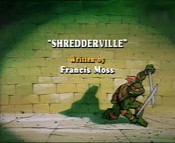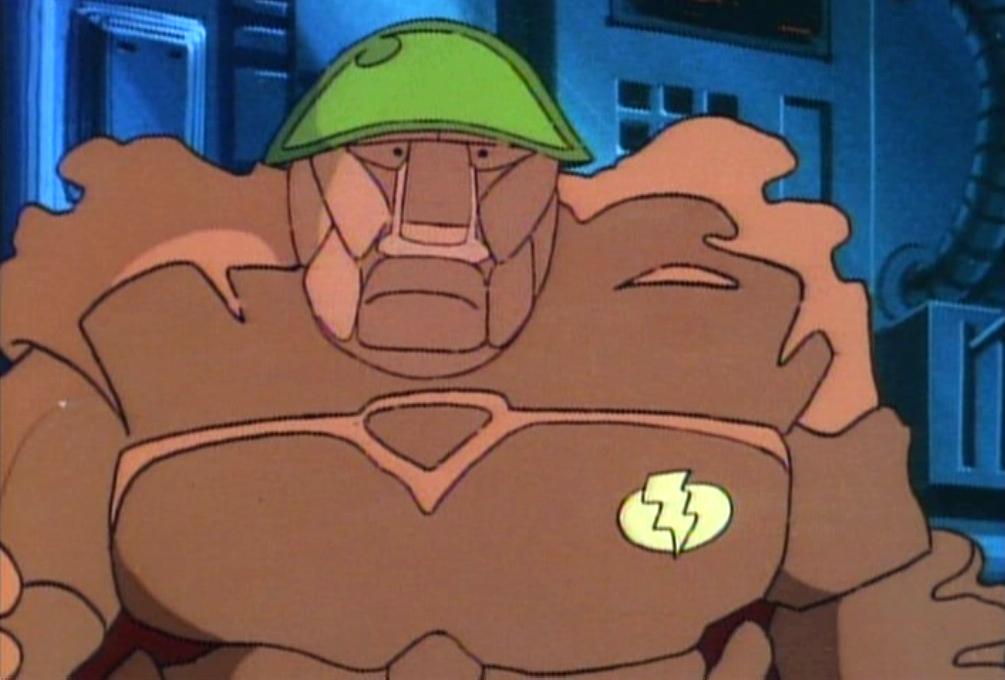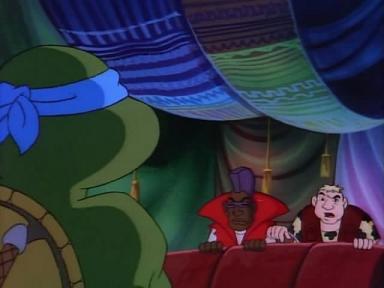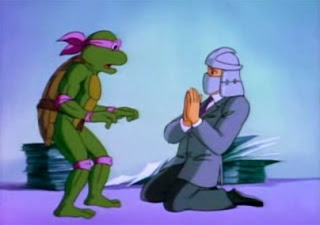Or any other variant, such as “it was a ghost who did everything!”
The absolute worst ending you can have in any narrative is “it was all a dream.” Not only does it reek of laziness and sheer incompetence, it also cheats the reader of well-deserved catharsis and closure. Any narrative instructor worth his or her salt in any language will always tell you never to end with “it was all a dream,” but today I’m going to explain why as a professional writer, you should ever end your story this way.
Below is an episode of the 1980s Teenage Mutant Ninja Turtles cartoon, “Shredderville”. The resolution of this episode is “it was all a dream.” Take a watch. See why this is a terrible way to end.
So what’s so terrible about it?
(Image from The Big Cartoon Database)
There’s no resolution or pay off
You cheat the reader, as I mentioned earlier. You build up this conflict, create this dramatic tension, put so many obstacles in their way – and then all that is flushed down the toilet bowl. You create a wrong that has to be righted – except that wrong wasn’t really existent in the first place! But when you set up a conflict, you must resolve it. Someone wins, or a great sacrifice is made, or a greater conflict results.
Resolving a conflict by saying “surprise, it didn’t exist!” is not a legitimate way to end. And that’s what “it was all a dream” does. It’s akin to me telling you about the most wonderful coffee in the world at this little cafe, and when we get there you find out it’s actually a bookshop and that coffee doesn’t exist. Yes, it’s a resolution – but one that makes you want to punch the face of the writer.
It can be summed up in a question of four words.
“What was the point?”
In this episode, you can make a case for it by saying “it teaches the Turtles to appreciate their own existence.” But fridge logic – if the Turtles’ own minds generated this dream, then doesn’t it mean they knew this all along subconsciously? Francis Moss, I’ll remember this atrocious ending of yours.
Once again – “what was the point?”
It allows you to justify any ludicrous situation
Which is great, you might think. Any ludicrous situation is every creative’s dream, right? A boundless canvas upon which you can paint.
Except creativity is created from restrictictions and boundaries. Because you have no reason to anchor it in reality, it has a chance to easily spiral into the realm of nonsense. Every good story needs an element of relatability, which grounds it in reality. But when you have free reign to create any ludicrous situation, without having to deal with the consequences, it becomes a world that readers cannot believe in.
In “Shredderville”, the world is falling apart thanks to Shredder’s inept management. But then because it’s a dream, there’s no limit to how many things can fall apart. Yes, there’s this pathetic attempt to stop the Technodrome from exploding, but how is that resolved? Do you even care? No, because the world is too far fetched to give you a sense of identification.
(Image from Turtlepedia)
It’s lazy
How did the Technodrome’s impending explosion end? Not with Leo’s heroic sacrifice, nor Don’s pseudo science, nor Raph’s quick witted thinking, nor Mike’s straightforward solutions.
Because they woke up.
There’s not even a semblance of tying the Turtles’ personalities into the resolution (unlike previous episodes). If the Turtles weren’t there, things would have played out the same way. There’s no effort to even tie up the hundreds of dangling plot lines created by a Shredder-ruled world.
If it were a simple, elegant solution, it might not be so painful. Here, it’s a blunt and easy hammer that allows you to wipe away every problem created with one sentence.
I might as well link every post to another writing blog in that case.
There are no stakes and no threats
Because it’s a dream, when you realise it’s a dream – there are no stakes. The heroes have nothing to lose whether or not they manage to overcome this obstacle. They’ll be perfectly fine no matter how this plays out.
And this is incredibly dangerous, because we lose tension (no danger to the heroes) and we don’t care about what happens to the Turtles. They’ll be all right in the end. There’s no satisfaction gained from watching this episode, because they were never in any real trouble to begin with.
(Image from OV Guide)
No character development
I pointed out earlier that if this dream was self-generated by the Turtles, it means that they subconsciously knew the lesson already. And if they already knew internally, what have they learned? Nothing.
Do we see a resolution born of the personality traits of one of the Turtles? Nope. If none of them were there, or let’s say it was the Power Rangers in this world, it would have all ended the same way. The resolution isn’t character-dependent.
They’ve learned nothing, and hence their personal growth is zero. They wake up appreciating their own existence more, but how is that unique to them? Shouldn’t everyone appreciate their own existence? Otherwise, wouldn’t they all be committing suicide?
(Image from Down The Street)
But wait. You’ve seen episodes or stories where it was a dream, but it ended pretty well. A Wonderful Life comes to mind (apparently, this is what the episode was based on).
There are exceptions that will allow the “it was all a dream” resolution to work. Effectively, “it was all a dream” isn’t the resolution, but part of the beats on the way to a bigger, more satisfying resolution.
The dream is really a trap
If the characters realise that the dream is something they have to escape, then a real problem is created. The characters might be trapped in the dream world forever. It might be an idyllic world, or it might be a dystopia. But therein lies a genuine conflict – the characters must escape a box.
I personally like episodes where the characters find themselves in a perfect world, and must show strength of character to break free from that world. It gives them character development, and it shows us why they are the heroes – they must give up everything they wanted because they know it is not genuine. They would rather accept an imperfect reality than a perfect fantasy.
The dream is inflicted by an external party
Related to the above, but if the dream world is inflicted by something outside of their own consciousness, then it is a legitimate situation to be in. Because this means that it’s not their subconscious rising to the fore and trying to show them something, it means that an external party is involved. And any time there’s a protagonist and an external party, this means conflict.
I can’t find the link, but a good example of this is the Justice League Unlimited episode, “For The Man Who Has Everything.” Of course it features a fight between Superman and Mongul (who is almost as strong as Superman), so there’s that added bonus.
But I assure you, this post was not a dream.




Leave a Reply